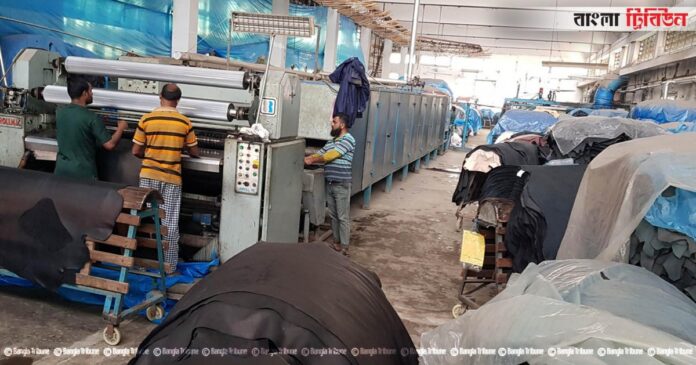Hundreds of business establishments in the country are closing due to various reasons including financial crisis. In the last two months (August and September), more than one and a half hundred companies of various domestic and foreign groups, including Citigroup, BSRM, US-Bangla, have decided to wind up their business. Foreign companies are also closing. The employment of lakhs of people is going to be at risk.
Analysts say businessmen have to deal with the adverse effects of rising production costs due to inflation, declining sales, high interest rates, labor unrest, transportation and technical problems, shortage of raw materials due to dollar crisis, global wars and flash floods. In addition, political changes have limited the opportunities for some companies to do business.
According to the information provided by the companies, as per the decision of the board of directors – the establishments are closing down permanently. In the meantime, about 160 companies are in the process of closure. Several institutions have submitted necessary documents along with closure application to RJSC. Again, some companies decided to close the company in the general meeting.
The closure list includes small firms as well as large group firms. These companies registered in the Department of Joint Stock Companies and Firms include both supply and service sector organizations. Besides, the companies registered with new investment plans are also on the closed list.
In recent times, the country's top export garment sector has been in turmoil due to political uncertainty as well as labor unrest. If this situation does not improve, traders will be in more trouble.
According to the Directorate of Joint Capital Companies and Firms (RJSC) data, 128 companies closed in the last 5 months (May to September). In August alone, a record number of 46 companies were completely closed. In the following month, September, 26 companies were closed. In the three months of July-September, 83 companies were completely shut down. According to RJSC data, the number of company closures started increasing from July, the first month of the current financial year. According to the government, 16 private companies closed down in June. 21 closed in July.
According to the information of the government agency, 275 companies were closed in the last financial year, but in the three months of the current financial year, it is assumed that the number of closed companies may double by the end of the financial year.
In this situation, if the business environment does not improve, the concerned people fear that more companies will be closed. Even new possibilities are not seen as there is no initiative to attract investment. In this situation, businessmen want the help of the government to solve the problem.

In this context, Dhaka Chamber President Ashraf Ahmed said that our private sector is facing various problems including devaluation of money, high inflation, lack of foreign currency reserves, high interest rates of bank loans and obstacles in opening loans. He said to Bangla Tribune, “Our business costs are constantly increasing due to the imposition of various types of fines and procedural complications in the customs duties of the port's import products.”
Meanwhile, the World Bank said, there are major challenges in creating employment in the institutional sector in Bangladesh. Because, still 84.9 percent employment is in the informal sector. This is a very high number. Between 2016 and 2022, employment in the manufacturing sector declined by 9.6 percent.
According to the World Bank, political uncertainty, inadequate law and order situation and labor unrest in the industrial sector are the three main obstacles to the normalization of economic activities in Bangladesh.
This is what the World Bank said in the 'Bangladesh Development Update', the World Bank's latest report on the economy of Bangladesh published on Tuesday (October 15).
According to the World Bank report, currently one of the main challenges of Bangladesh is employment generation, job quality and skill shortage. One of the reasons for the student-led mass uprisings is the increasing trend of limited job opportunities.
The report also said that there are several challenges in the economy of Bangladesh at the moment. Among these are high inflation, external sector pressures, financial sector weakness and political uncertainty. Besides, Bangladesh Bank has increased the loan interest rate to reduce inflation. This has reduced borrowing in the private sector. Due to these reasons the economic growth may decrease.
However, a director of one of the country's top corporate groups, who did not want to be named, told the Bangla Tribune, “The companies that took various benefits from the previous government and did business with bank money, are now in trouble. They may be shutting down the company. But those who are real businessmen are rather opening new companies.' He mentioned that companies like Square or Yamuna Group are increasing new business. Even Salman F Rahman's Beximco Group is not shutting down any of its companies. He hopes that BNP businessmen will start registering new companies soon.
However, the information of the Department of Joint Capital Companies and Firms under the Ministry of Commerce also says that on one side the company has been closed but on the other side the entrepreneurs have opened a new company under a new name. According to the government, the rate of new company registrations has increased every month since last June. According to RJSC's October 6 update report, 3,805 new companies have been registered in the last 5 months (May to September). During this period, the Department of Joint Capital Companies and Firms received more than 4,000 applications for new registration.
According to RJSC data, 26 companies were closed in September but 968 new companies were registered this month. In August 46 companies were closed but 717 new companies got new registration. 21 companies closed in July, 647 new companies registered that month. Similarly, in June 16 companies were closed but 632 companies got new registration. And in May of this year, 19 companies were closed, but 841 companies got new registration.

In this context, former president of Dhaka Chamber and vice chairman of AK Khan Group, Abul Kashem Khan told Bangla Tribune, “Registration of new companies or closure of companies is a regular matter of business.” He said, 'Some group closes one company and often opens four new companies. Different individuals or groups closed earlier companies for different reasons. Some close the company to avoid tax, some close the company to avoid losses, and some close the company to invest elsewhere. For example, for the last four years, the operations of one of our institutions have been closed. But every year unnecessary tax has to be paid. I closed one of my establishments because of this. But we are not shrinking our business. Going ahead with more investment plans differently.'
He mentioned that the problems in the country's economy started three years ago. Now that we can see. But Bangladesh is a promising country. We are hopeful that the domestic and foreign investment will start in Bangladesh soon.
Incidentally, the arbitrator has been appointed in the closure of AK Khan Water Health (Bangladesh) Limited, owned by this business leader.
Meanwhile, the statistics of RJSC says that the registration of new companies in the financial year 2020-21 is the highest. Companies were opened with 14 thousand 826 new registrations in that financial year. In the financial year 2021-22, registration has been taken for 13 thousand 485 companies. In the next two financial years, 2022-23 and 2023-24, the number of registrations dropped to 10,000. In the first three months (July-September) of the current financial year, 2 thousand 332 companies have received registration of new companies.
There are 2 lakh 95 thousand 471 institutions registered in the country (as of September).
Companies that are closing down
Citigroup, the country's top local corporate trading house, is shutting down 30 of its companies. These include City Hair Oil, The Asia Pacific Refiners, City Seed Crushing Industries (Unit-2), Hassan Dal Mills, City Fibers, Hassan Pet Industries, Hamida Plastic Containers, Hassan Plastic Industries, City Biscuits, City Condensed Milk, Hamida Agro Food, Shampa Power & Energy, Rupsi Sugar Mills, Shampa Sugar Industries, City Poultry & Fish Feed, City Vegetable Oil Mills, Konapara Oil Mills, Hasan Vegetable Oil Mills, F Rahman Oil Mills, Azgar Oil Mills, Farzana Oil Refineries, City Bran Oil, City Coconut Oil Mills, Rahman Coconut Oil Mills, Sagurnal Hatchery and Fisheries, F Rahman Shipping Lines, City Pre-fabricated Steel, Hossaindi Paper Mills, City Tasty Bite and Deepa Food Products. The group has appointed liquidators (liquidators or individuals) to wind up these companies. Advocate GK Rajvanshi convened the EGM in September to wind up the company.
The US-Bangla group is going to close down five of its companies. In this regard, the EGM of the company was held last September. In that meeting, appointments were made for US-BD Security Services, US-Bangla Group, US-Bangla Furniture, US-Bangla Pharmaceuticals and US-Bangla Agro.
It has been reported that Asmat Ali Khan Central Hospital Limited, an institution built in Madaripur in the name of former shipping minister Shajahan Khan's father, is closing down. Another company in the health sector, Lab Quest, is also shutting down. Cific Basak & Co. has been appointed as the liquidator for the closure of BSRM Recycling Industries of BSRM Group, a leading steel company. Meanwhile, Diamond Gold World and Diamond Gold Manufacturing are closing down. Intake Greenpack, a paper cup manufacturer, is also closing down.
Foreign companies
The company's managing director, Sen Suhui, has appointed a liquidator for the closure of Jinpeng Trading Company last August. Taiwan-based Maryland Engineering Company has also taken the initiative to close. Entrepreneurs have decided to close the Singapore-based Huiding Private Company. South Korea-based company Bride Medical and Education Service Limited decided to close it voluntarily at the EGM last August 11. India-based international company Shipcard Marine Bangladesh Limited has decided to voluntarily close down. Kite Tech International (SA) Limited has approved the closure at their second EGM.

